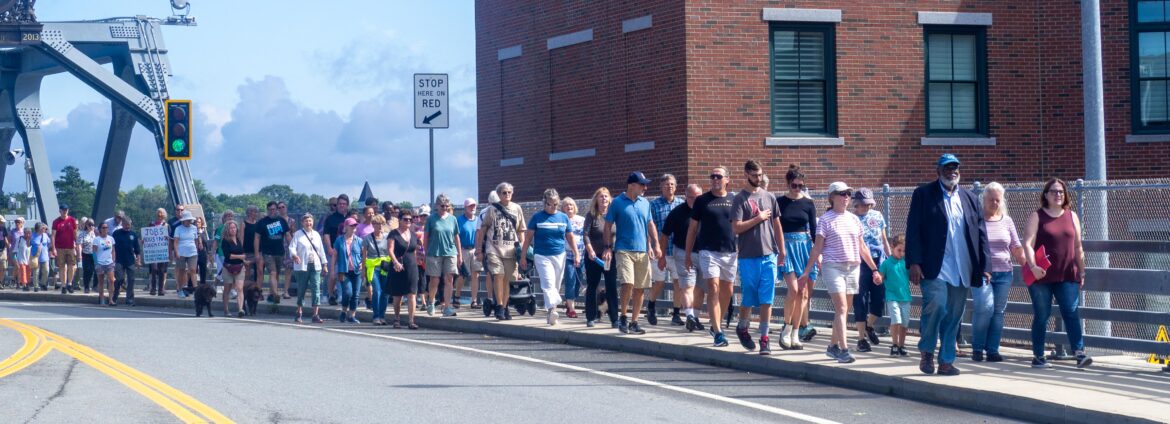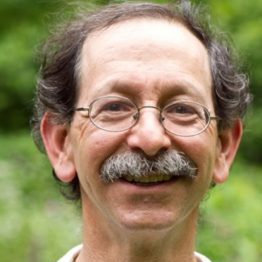
Arnie Alpert spent decades as a community organizer/educator in NH movements for social justice and peace, including a year as a member of the Clamshell Alliance office collective. Officially retired since 2020, he keeps his hands (and feet) in the activist world while writing about past and present social movements.
Sixty years after the March on Washington
By Arnie Alpert, Active with the Activists
PORTSMOUTH – Peter Cass recalls hopping on a chartered bus from his home in Swampscott, Mass. and joining the 1963 March on Washington, now remembered largely for Dr. Martin Luther King’s “I Have a Dream” speech.
But Cass didn’t hear the speeches from the far end of the mall. “I just remember massive, massive crowds of people,” the Portsmouth resident said Saturday before joining 95 people marching across the Piscataqua from Kittery to the African Burial Ground in Portsmouth.
“The most memorable thing was looking down the mall from the far end and seeing nothing but an ocean of people,” Cass recalled.
Cass wasn’t the only one who had been at the historic event and attended the local commemoration, organized by the Black Heritage Trail of New Hampshire.
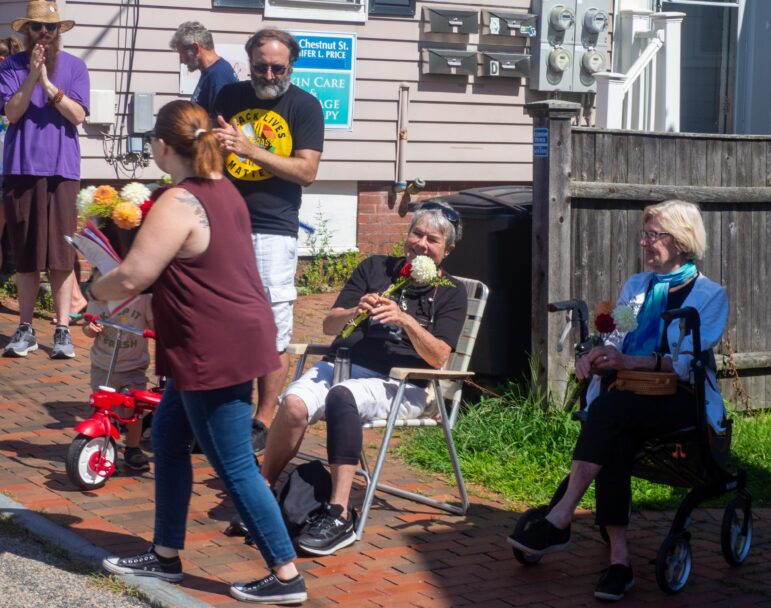
Sixty years ago, Pat Yosha drove to Washington with friends from Connecticut, where she was a high school English teacher. “We could hear that there were speeches, there were speakers up in the trees, but not exactly what everybody was saying,” the Exeter resident remembered. When she returned to her West Hartford classroom, she introduced more Black writers, such as James Baldwin and Richard Wright, into the curriculum.
Nancy Pollock was 15, living in the Philadelphia suburbs, part of a liberal Jewish family. “We felt very strongly about civil rights, and I really wanted to be part of it,” she said on Saturday. Her mom approved. To get to the march, Pollock and a friend caught a ride with his brother and sister-in-law. She was too far away to hear the speeches.
Judith Rubinstein also grew up in a liberal Jewish family, in Westport, Conn. Her father was one of 17 rabbis arrested at a civil rights protest in St. Augustine, Fla., in 1964, and she remembers meeting Dr. King in her home when she was 8 or 9.
“I was busy getting ready for a Girl Scout camp out. And I had a list, very careful, detailed list of how I was to prepare my bed roll. And my father called me from downstairs and said, ‘Judy, come down. There’s someone I want you to meet.’” She told her father she was too busy. “And I stayed up in my bedroom, carefully rolling my sleeping bag in my blanket. And my father brought Dr. King up to my bedroom.”
As for whether she was at the March on Washington, the record isn’t clear. She thought she had stayed home with her brother when others went to Washington on a chartered bus. But her brother says he was at the march and says so was she. Rubinstein certainly doesn’t remember any of the speeches.
Nancy Lukens’ memory is clearer. She had a summer job at the Pentagon and walked across the bridge to join the march, hoping to hear Marian Anderson sing. Like the others, she doesn’t remember hearing any speeches, but remembers “drowning in the sea of beautiful people.”
“Being in that crowd made me feel I belong,” Lukens said. “That was the first time I ever felt I belonged anywhere.”
The times were a-changing, and whether the quarter million people on the Mall could hear the speakers, the significance of the 1963 March on Washington was quickly apparent. Remembered now as a joyous occasion where Dr. King delivered one of the greatest speeches in American history, the march had not been welcomed by President Kennedy, who feared it would set off an anti-civil rights backlash in Congress. As the date of the march approached, “Meet the Press” commentators who didn’t believe thousands of Black people could peaceably assembly warned it would spark riots. The Pentagon readied 19,000 troops in the DC suburbs just in case. Instead, it was a thoroughly peaceful, inter-racial assembly that built on the attention generated just a few months earlier by the Birmingham protests and made the call for civil rights legislation harder to resist.
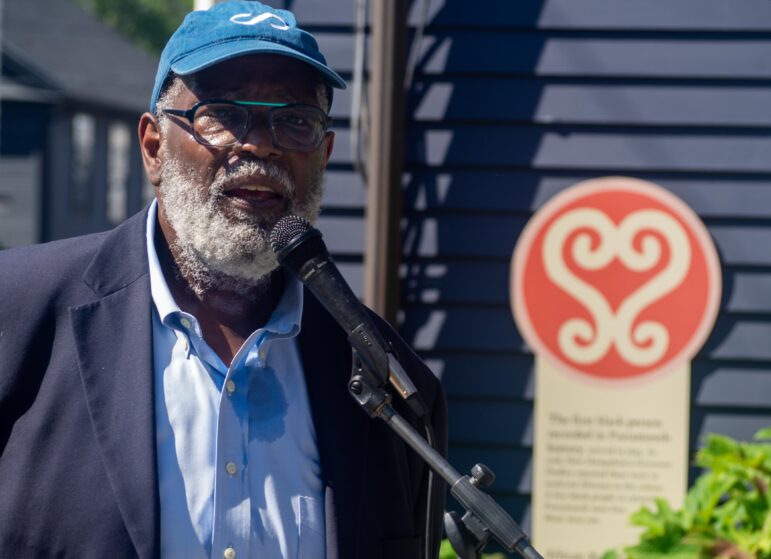
Saturday’s 60th anniversary march wasn’t just about the past, speakers and marchers emphasized. “Today has been mentioned by some as a celebration,” said the Black Heritage Trail’s board chair, Dwight Davis, when the program began at the African Burial Ground a block from downtown Portsmouth. “Others say that it is a commemoration,” he continued, “and still there are others who talk about this as a continuation. And those of us here know that it is indeed a continuation of the fight, of the march for equality in America.”
Speaking to about 100 people, Davis described growing up Black in Texas before the civil rights revolution and experiencing the pain of “loving a country that doesn’t always love me back.” By the time of his eighth birthday, his pride at sharing a name with the president of the United States was displaced by awareness of the racist oppression he saw around him. “I started to understand the difference between the neighborhood ‘Leave It to Beaver’ lived in and the neighborhood I lived in,” he recalled.
For Davis, “the more things change, the more they remain the same.” He rattled off issues confronting the country now: attacks on voting rights; income and wealth inequality; and racial disparities in health care, housing, and life expectancy. “So, I say all this just to remind you, and hope you will join me, join all of us, in a continuation while we celebrate and commemorate,” he said. “The March goes on.”
Camilla Thompson of Black Lives Matter Seacoast spoke briefly about the 1963 march, which marked the 100th anniversary of Abraham Lincoln’s Emancipation Proclamation ending slavery in the states of the Confederacy. On that day, 250,000 people from all races converged “with hopes and prayers to push our nation just a little further to demand equality for African Americans in the workplace with new federal jobs and a higher minimum wage,” she said. “They also called for Congress to pass a law of full integration of public schools and a bill prohibiting job discrimination. This act was later signed and called the Civil Rights Act of 1964.” Her comments were an important reminder of the 1963 march’s purpose.
Named the March on Washington for Jobs and Freedom, the event was orchestrated by labor leader A. Phillip Randolph of the Brotherhood of Sleeping Car Porters and organized by Bayard Rustin, a gay, Black Quaker. In addition to the major Black civil rights groups, such as the NAACP and Southern Christian Leadership Conference, the march was heavily backed by the United Auto Workers. And as Tanisha Johnson of Black Lives Matter Seacoast made clear when she read excerpts from Dr. King’s 1963 speech, the agenda had a major economic component.
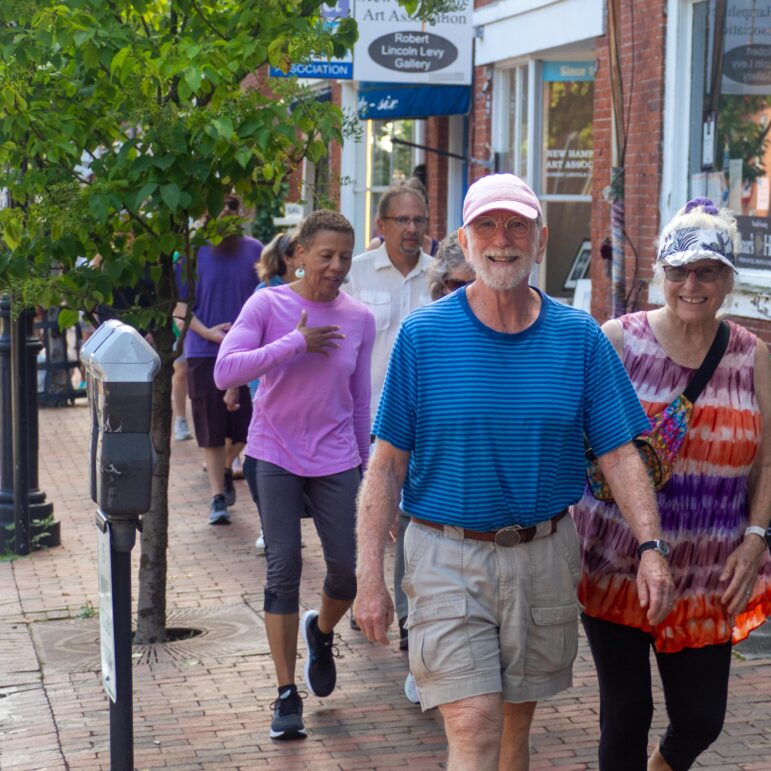
Although attention generally focuses now on the lofty rhetoric at the end of Dr. King’s speech, Johnson recited key lines from the earlier section. One hundred years after slavery’s end, Dr. King said, “the colored American lives on a lonely island of poverty in the midst of a vast ocean of material prosperity. One hundred years later, the colored American is still languishing in the corners of American society. In a sense, we have come to our nation’s capital to cash a check. When the architects of our great republic wrote the magnificent words of the Constitution and the Declaration of Independence, they were signing a promissory note to which every American was to fall heir.”
As Dwight Davis said several times, “the more things change, the more they remain the same.”
“We refuse to believe that the bank of justice is bankrupt,” Dr. King said sixty years ago. That’s a sentiment echoed Saturday by Rev. Robert Thompson of the Seacoast NAACP, who led the march and also addressed the African Burial Ground assembly. Recalling his own childhood experience of racism’s evils and the momentous days of the March on Washington, Rev. Thompson channeled Dr. King’s spirit, saying, “I think of myself as an aspirational patriot. I hope all of you here are aspirational patriots, dedicated to the idea of America, and always aspiring, aspiring for the best in our nation that we can really manifest full justice for everyone.”
“Everyone,” Rev. Thompson emphasized. “Full justice. The ability to vote without impediment. The right to stand with dignity. Full justice for all Americans.”
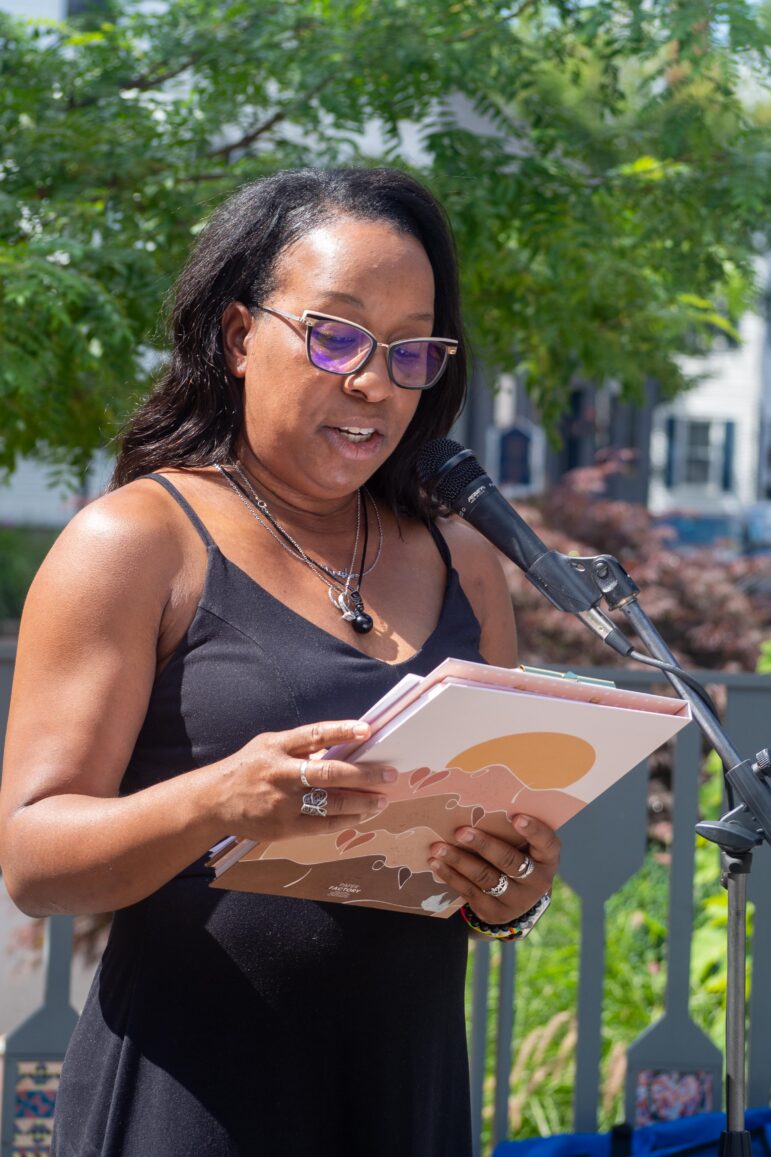
“We, here now in this nation at this critical time, for so much seems to be on the precipice of something great or horrendous,” Rev. Thompson said later in the program. “We need to remember that men and women of all colors have lived and fought, breathed and died for the freedom of all Americans, for the right of all Americans to enjoy all the rights that America offers. The right to vote, to work, to earn a living, to raise a family, to love, to laugh. The right to be free. Let us here today resolve in a new way to do our part, to establish justice, to never take it for granted that it is being done by someone else, to always reach for the right for dignity for all Americans. Let us always aspire to help America be the best that it can be. Let us do that on this day. And let us do that on every day.”
As Gina Bowker of the Black Heritage Trail passed out flowers to those who had been at the 1963 march, Rev. Thompson led the group in singing “America the Beautiful.”
The celebration/commemoration/continuation concluded with everyone joining hands and singing, “We Shall Overcome.”
“This long march for civil justice for the rights of all Americans is one we’ve all aspired to,” Rev. Thompson said. “Black folks, white folks, all religions, all colors, all genders, all orientations. We all are part of this ongoing journey to make America a truly great nation. I hope we never grow tired.”
Everyone heard him clearly.
